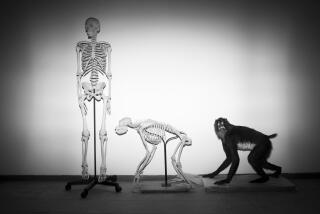Another brick falls
- Share via
THE “DNA REVOLUTION” is usually mentioned in discussions of criminal justice because of the way telltale genetic evidence has made it possible to prove guilt or innocence. But it isn’t just prosecutors and jailers who have had their lives complicated by the double helix. DNA research has forced scientists to rewrite their accounts of the history of life, in the process debunking some cherished myths -- such as the notion that the English and Irish peoples are different “races.”
The latest narrative to bite the dust because of DNA evidence is the (relatively recent) theory that humans and other mammals turned an evolutionary corner soon after an asteroid collided with Earth 65 million years ago, dooming the then-dominant dinosaurs either by creating a cloud of dust that blocked sunlight or by producing clouds of sulfuric acid.
With huge dinosaurs gone, room was created for smaller mammals that were the ancestors of today’s dogs, cats and humans. That was the theory, anyway. Now it seems that the mammals that thrived after the demise of the dinosaurs were an evolutionary dead end.
Using DNA to construct a mammal family tree, researchers at a German university have concluded that the warm-blooded beneficiaries of the dinosaurs’ departure were not the direct ancestors of modern mammals but rather a distantly related species that later died out. (And a good thing, too: They included the carnivorous Andrewsarchus, a lion-sized creature with deadly jaws.)
According to this study, it wasn’t until 10 million to 15 million years after the asteroid hit that our ancestors, who had lived a marginal existence before and after the cosmic collision, began to diversify themselves, starting on a pathway that eventually led to us.
The German study isn’t the first DNA-driven project to rewrite prehistory, and it won’t be the last. Jackson Browne is a singer-songwriter, not a paleontologist, but some lyrics from his song “Fountain of Sorrow” have proved prescient:
And while the future’s there for anyone to change, still you know it seems
It would be easier sometimes to change the past.






